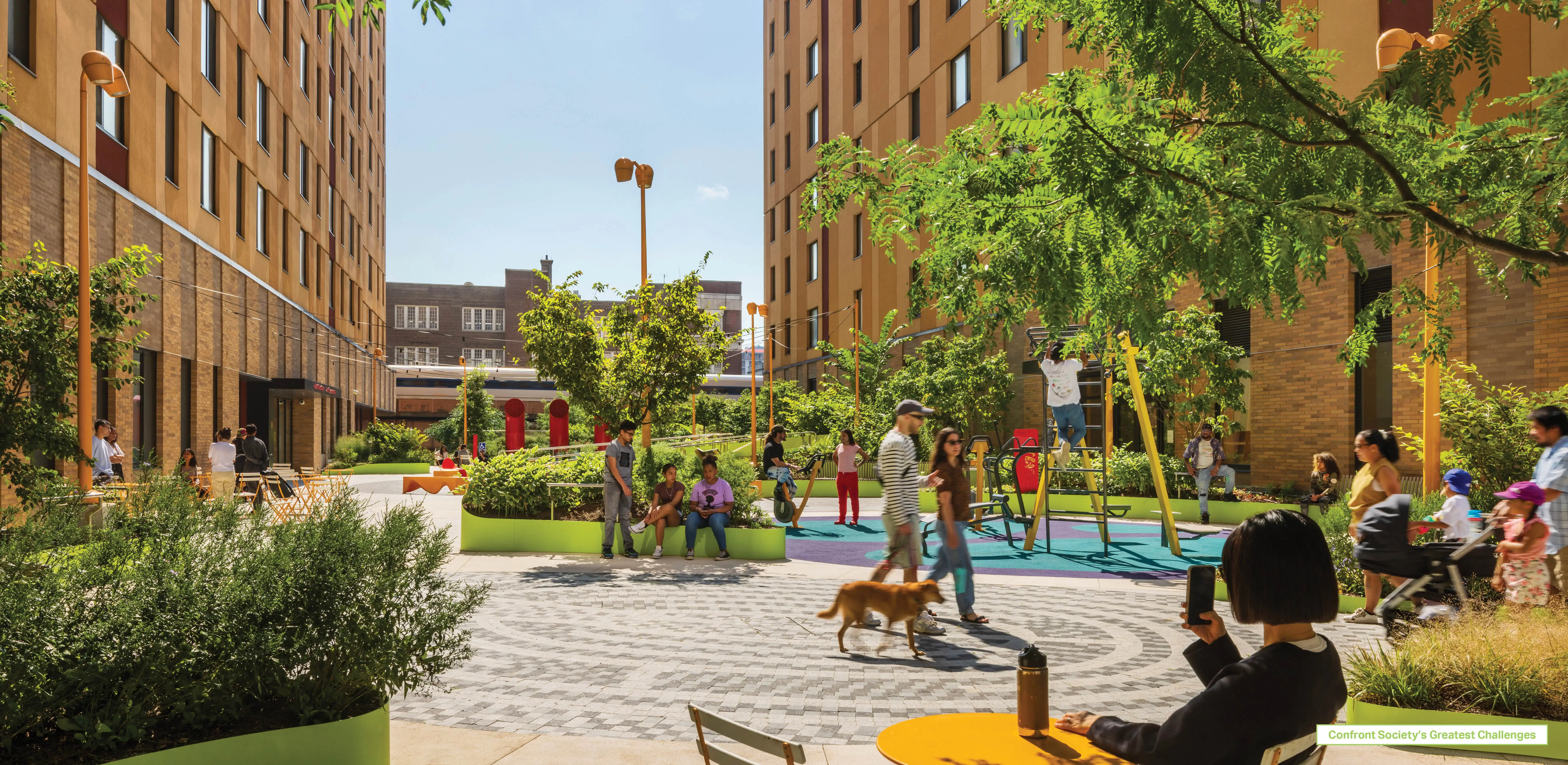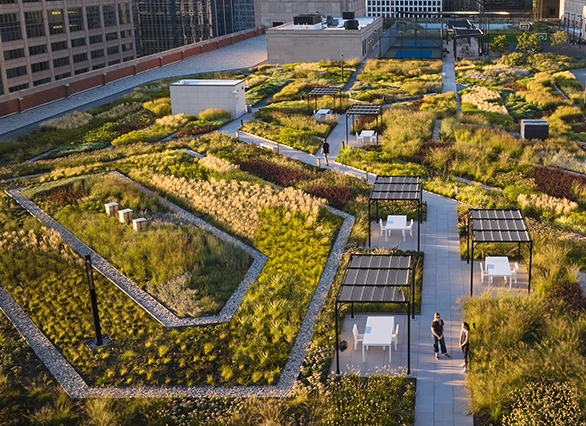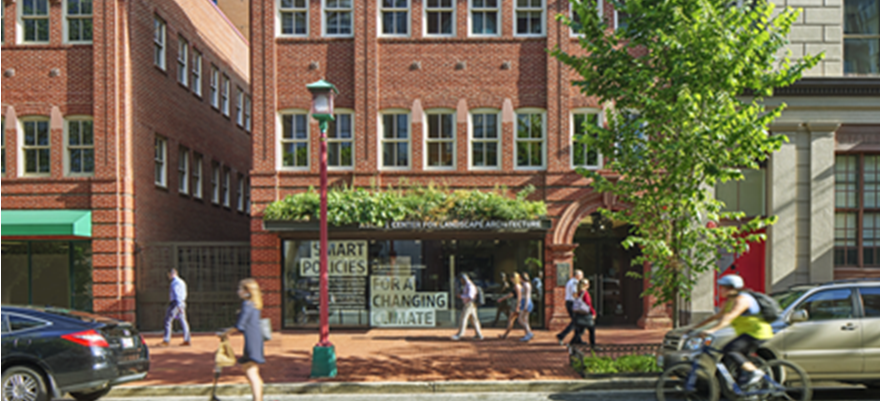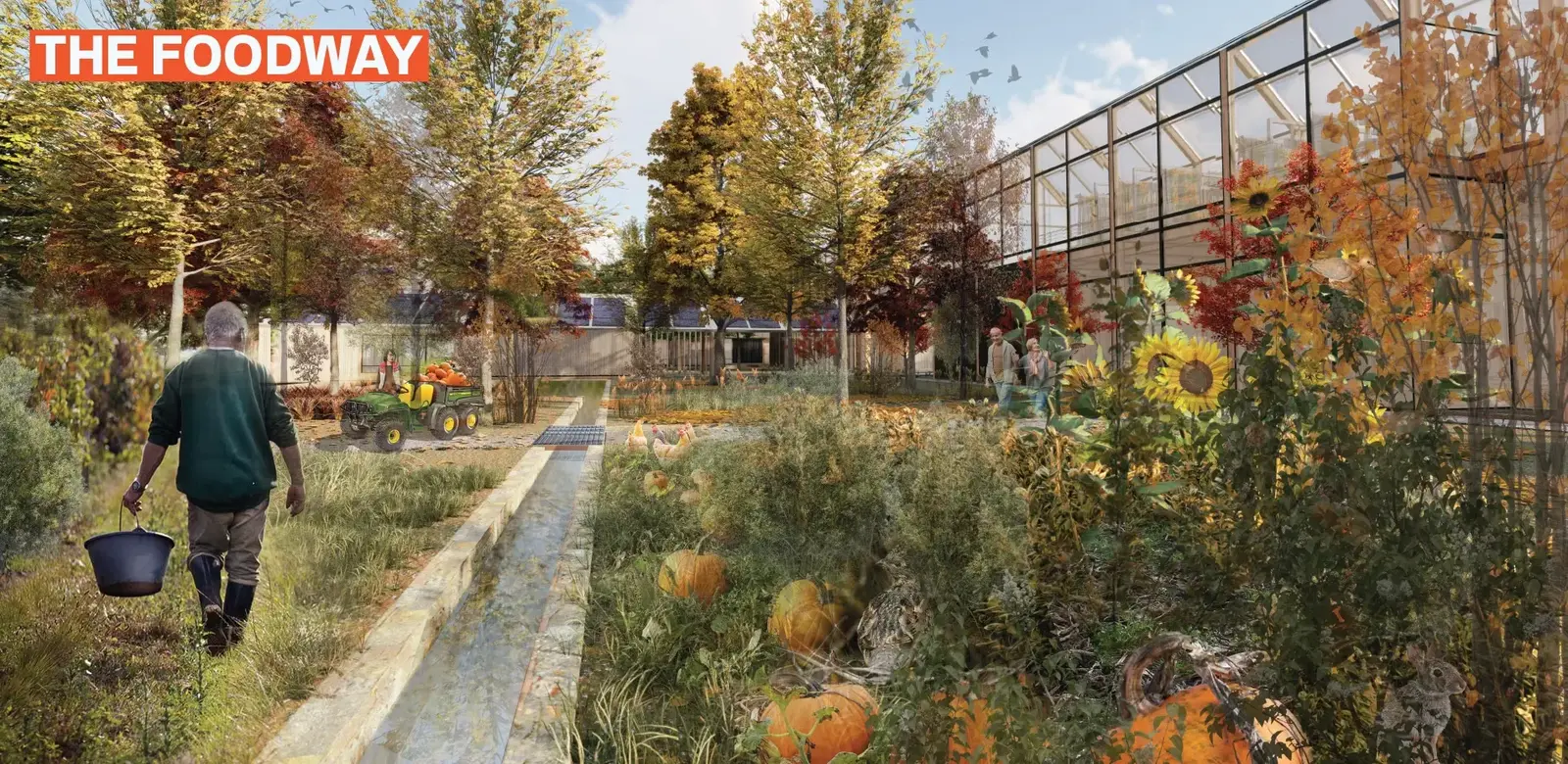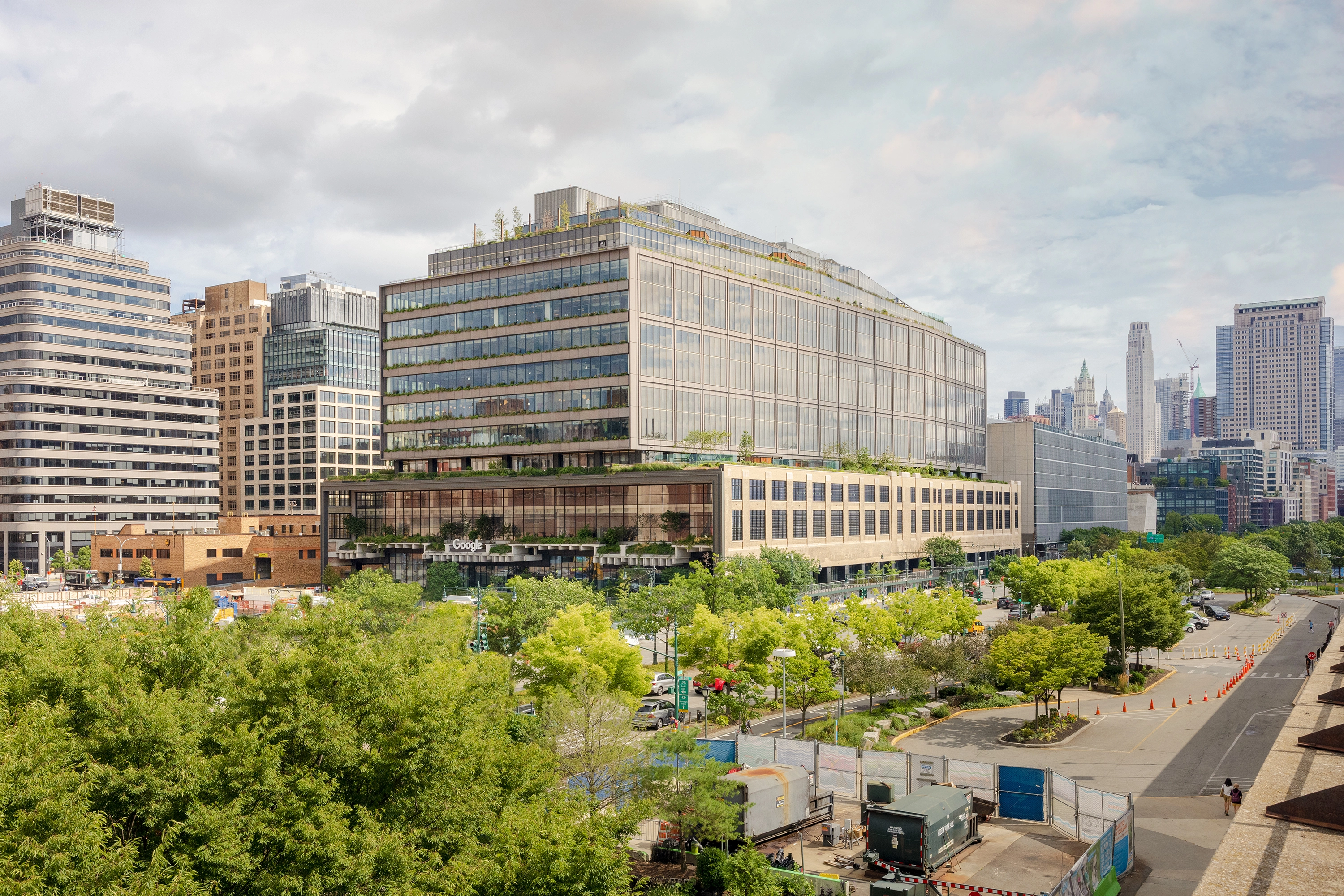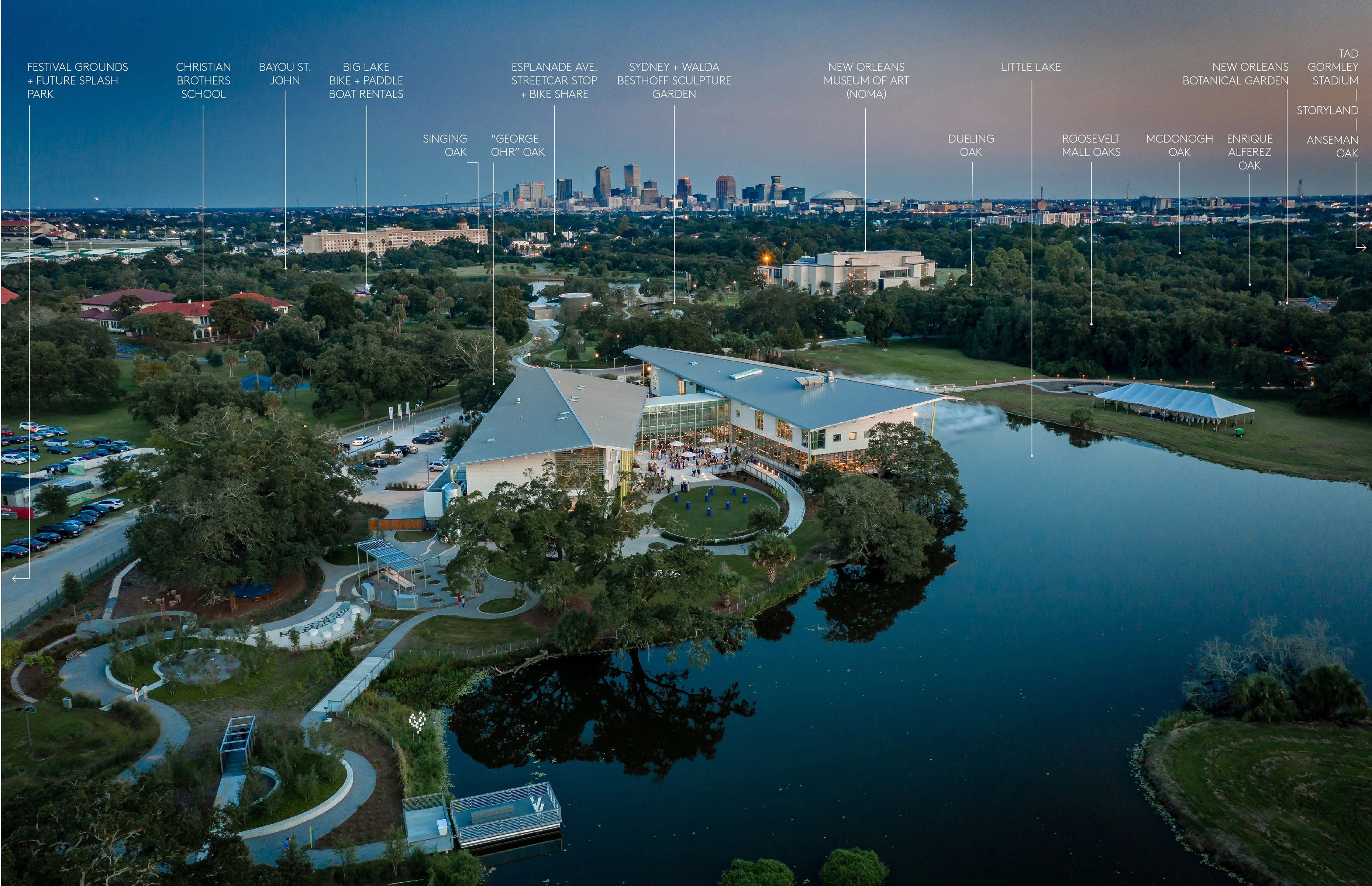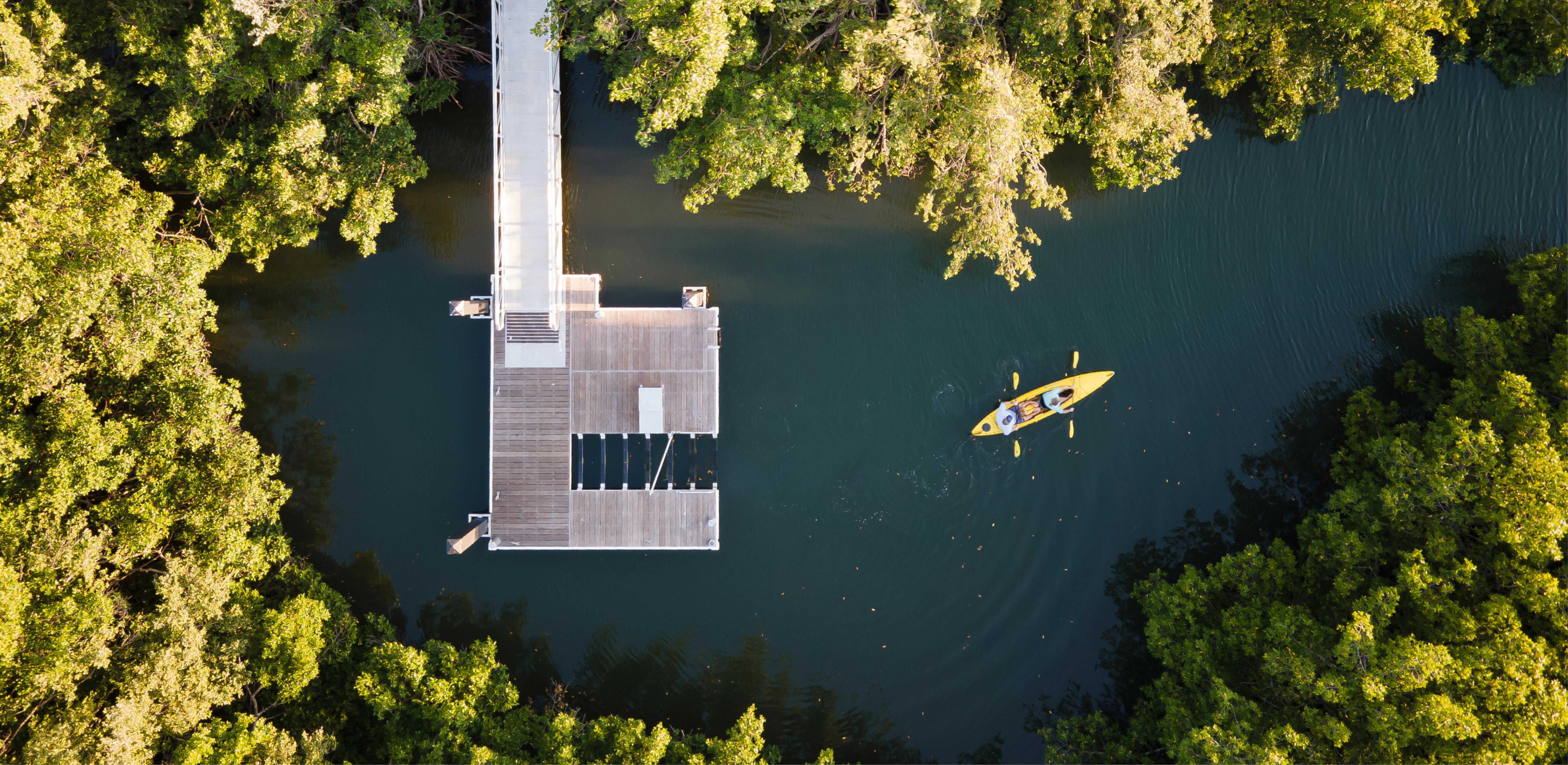The Foodway
Ben Magee, Associate ASLA; Jacob Costello, Associate ASLA; Max Frank, Student ASLA
A brownfield site in Fayetteville, Arkansas, becomes the expanded version of Tri Cycle Farms, a non-profit organization that harnesses community agriculture to promote food awareness, education, and empowerment. The farm responds to its Ozark milieu by showcasing and encouraging guest exploration of the variety of produce cultivated across demonstration gardens and landscapes of grassland, forest, and woodland. Hydroponic greenhouses allow year-round produce cultivation, and structures on the site have been designed to meet the Living Building Challenge standard, with maximum flexibility for multiple uses—including a restaurant that epitomizes the farm-to-table movement by sharing food made from the plants that surround it.
Awards Jury
-
The Foodway establishes a vibrant participatory culture of food and food production in Northwest Arkansas. Transforming and revitalizing an abandoned brownfield site, The Foodway tells a story of growth and rehabilitation. Northwest Arkansas is experiencing rapid growth, contextualized by COVID-19, the climate crisis, and regional food insecurity. In the wake of these issues, The Foodway imagines a model system of food production, where ecological health, community vitality, and social equity all manifest in an accessible, urban farm. As a new campus for Tri Cycle Farms, a local non-profit community garden with dedicated food waste reduction impacts, The Foodway becomes a vessel for the organization’s three pillars: awareness, education, and empowerment. Industrial farming is commonplace in this region, and The Foodway seeks to connect visitors to the natural, social, and cultural systems of food. The Foodway is a demonstration site for Northwest Arkansas and the greater region, cultivating education, awareness, and empowerment through community driven urban agriculture.
-
Foodways
Food has a unique role in our lives. It is a necessity as well as a cultural, social, and economic engine. Food is a source of joy, and an opportunity to empower, educate, and raise awareness.
Northwest Arkansas has a rich and varied food history. From the indigenous cultures which managed the Ozark forests for hunting, to early Anglo-American agriculture, to the 20th century poultry, apple and spinach farms, to the industrial farming operations such as Tyson Foods, this landscape has been dramatically transformed over the past centuries.
As Northwest Arkansas grows rapidly, we imagine a new chapter of food production creating new, regenerative relationships between people and the Ozark landscape. This vision for Northwest Arkansas establishes equitable, safe, and joyful access to fresh food and the ecological systems behind it. Tri Cycle Farms is the partner for this vision. This non-profit is committed to awareness, empowerment, and education through food and food sovereignty. A new site for this land-locked farm expands their capacity through a sustainable, community-driven, urban farm model, demonstrating a new concept of food systems in the fast-growing metropolitan area.
Project Context
Regional relevance and context
Northwest Arkansas' breathtaking growth comes from opportunities created by the presence of major corporate headquarters and to access to a high quality of life. Few regional models exist to show public investment in transportation, regenerative resource management, and bioregional food systems. COVID-19 food system breakdowns, the climate crisis, and food insecurity throughout the region reveal the timeliness for a new Ozark foodway. Foodways are stories of foods and the people that eat them. Foodways are the conceptual basis for the new design of Tri Cycle Farms. People can come to the site, create new stories and develop food culture unique to the Ozark bioregion.
As a model food system for Northwest Arkansas, this project leverages its prominent location along the Razorback Greenway to engage local stakeholders from public, institutional, and academic sectors. Uniting community members and change agents, this project sets a precedent for the region, fostering a culture of appreciation and stewardship toward food, ecology, and community.
Site
This project envisions a new location for Tri Cycle Farms which expands the scope of the organization and enables it to reach the residents of Northwest Arkansas on a greater scale. This new urban farm is proposed on an undervalued, affordable site of an existing brownfield in the heart of Fayetteville, Arkansas. Through remediation techniques and efficient design tactics, the site will be transformed from neglected brownfield to a thriving, urban farm with a cultural food center and educational facility. The site, owned by a concrete company, offers existing assets of gravel, slabs and concrete blocks for building. The size of the site allows Tri Cycle Farms to include space for housing its frequent AmeriCorps VISTA volunteers, and a multi-use parking/event space. A farm-to-table restaurant broadens Tri Cycle Farms’ reach to a wider range of people and creates a new revenue stream. An expansion of the existing food recycling and permaculture farm is also possible with the increased site area. The new design builds on the permaculture ethos, using the Living Building Challenge as a model for a sustainable development that is net-zero energy, water, and waste.
Living Building Challenge
The Living Building Challenge (LBC) has seven performance areas called Petals. Each performance area contains a series of more detailed requirements called Imperatives. The Petals are place, water, energy, health & happiness, materials, equity, and beauty. By using the Petals as a guide and the imperatives for performance, in the design of a retail building, office/cultural building, and housing, the site will demonstrate that an LBC building can work in the Ozark bioregion for a range of building types. All aspects of the site and buildings as modeled meet the LBC guidelines and imperatives.
Project Strategies
Urban Context Strategies (Awareness)
A programmatic overlay generated from context organizes the site plan. The highly accessible and visible frontage on North Street has great retail opportunity, while the ‘back’ of the site has housing to blend into the residential areas surrounding it. To the west of the site is the Razorback Regional Greenway; this intersection has the highest traffic counts in the regional bikeway system. The new design fronts North Street with a café and farm-to-table restaurant, visitors’ center, and multi-use event plaza for the community. These structures protect food production spaces from traffic noise. Travelling deeper into the site, community and production blend through greenhouses and residences nested with food forests. The landscape language of the site comes from the three principal plant communities in the Ozark bioregion. An established forest conceals storage, processing, and compost facilities.
Economic Viability (Empowerment)
Tri Cycle Farms’ existing programs extend its impact into the community. Working with food distribution networks, Tri Cycle Farms reclaims food from grocery networks, redistributing it to those in need or making it into compost. The expanded facilities and programming noted above allow Tri Cycle Farms to continue integrating into existing food networks and to generate revenue, empowering the organization to further its impact. Tri Cycle Farms can diversify its revenue on the new site through a community co-working space, offices, and event spaces.
The project can catalyze further collaboration from major stakeholders in the region, chiefly the state’s flagship land grant university. Tri Cycle Farms already has student volunteers and research partners who contributed over 22,000 volunteer hours in 2017. The increased profile of Tri Cycle Farms will build capacity to attract greater philanthropic funding.
Foodways Triad (Education)
This project places food growth within the broader context of ecological health and productive landscapes. Harnessing the experiential power of the Ozark Highlands landscape, food production is hidden in plain sight, dispersed through the language of three landscape archetypes. Three Ozark plant communities: forest, woodland, and grassland create distinct habitats for food, wildlife, and guests, and create identity. Traditional rows of produce with dynamic landscapes encourage discovery, participation, and attentiveness to seasonal change. The site design frames the experience of food production. Planting beds, wetlands, interior gardens, and food forests invite visitors to participate in a model of Ozark bioregional food ecology.
Design Tactics
The integration of site assets, and the Living Building Challenge set the guidelines for the design. We reuse existing resources as noted above and create building proportions to respond to passive and active solar energy. Buildings are long and narrow along east and west, and greenhouses orient north-south to maximize solar gain. Wetlands enable soil remediation, provide a self-sustaining water cycle, and treat all effluent from the site. The remainder of the proposed system is habitat--with places for people and food growing ecosystems.
Each space is flexible and adaptive to maximize its potential. This flexibility gives economic efficiency for Tri Cycle Farms and an outreach advantage. The café, co-working space, and event space allow visitors to discover the forest organically, increasing the outreach potential of the organization. A covered outdoor parking lot becomes a farmers’ market during the warmer months. Its solar canopy provides clean energy and shelter for community events that can generate revenue for Tri Cycle Farms. When not used as housing for AmeriCorp VISTA volunteers, the dwellings can be used as short-term vacation rentals, education spaces, or meeting rooms. The greenhouses exhibit best practices in efficient year-round food production. Processing and composting have maximum efficiency with convenient access for service vehicles.
Conclusion
The Foodway is a celebration of food and an invitation for participation to the Northwest Arkansas community. Built on a foundation of awareness, empowerment, and education, the Foodway challenges expectations of food production and sets a precedent for equitable and sustainable development in a rapidly growing region. The project empowers Tri Cycle Farms to further promote its mission of cultivating community through soil, leveraging the power of food to foster understanding and participation. -
- Scott Biehle - Faculty Instructor
- Beau Burris - Graphics & Post-production
-
- Cantaloupe
- Climbing Peas
- Grapes
- Pumpkin
- Zucchini
- Beetroot
- Carrot
- Ginger
- Onion
- Parsnip
- Sweet Potato/Potato
- Black Cumin
- Cranberry
- Lettuce
- Wintergreen
- Dill
- Garlic chives
- Parsely
- Rhubarb
- Sorrel
- Yarrow
- Blackberry
- Blueberry
- Goji berry
- Lavender
- Marigold
- Raspberry
- Apple dwarf
- Beech
- Elderberry
- Paw Paw
- Serviceberry
- Sassafras
- Alder
- Chestnut
- Hickory
- Mulberry
- Pecan
- Quince
- *Complete list on page 13

.webp?language=en-US)

